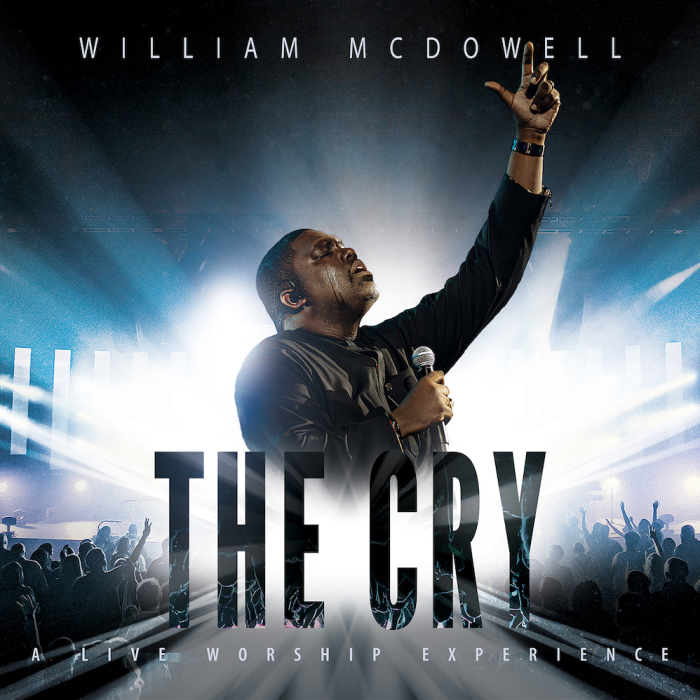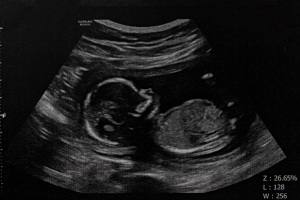William McDowell’s new album testifies of revival, miracles and 'The Cry' that God responds to today

Award-winning gospel singer and pastor, William McDowell released his latest project, The Cryon Friday and hopes the new album will help others cultivate a cry of desperation, inviting God’s presence to stay with his people and igniting a global revival.
The Cry was recorded at Redemption to the Nations Church in Chattanooga, Tennessee, and Pastor McDowell invited his congregation at Deeper Fellowship Church in Orlando, Florida, to be a part of the live experience. The singer describes the album as a collective experience because every song is about what his church has experienced in the last three years.
For 20 years, McDowell created music beckoning a revival. In 2016, the presence of God entered his church at Deeper Fellowship like never before, he said, and as a result, it has brought thousands to the ministry from all across the world and it hasn’t stopped. McDowell's church reports that hundreds of miracles have taken place since the start of the revival and, as observed by this reporter, people are standing in lines outside of his church to attend his Sunday services every week.
The Cry is McDowell's way of using melody and lyrics to describe the powerful experiences he and his church body have encountered while in the presence of God. The album features vocals from esteemed gospel performers, such as Nathaniel Bassey, Travis Greene, Yolanda Adams, David and Nicole Binion, Tasha Cobbs Leonard and newcomer Trinity Anderson (who leads worship at McDowell's church every Sunday).
Below is an edited transcript between McDowell and The Christian Post where he describes the outpouring of God his church has been experiencing and how it birthed his album while he also encourages others to cry out to God to experience the same.
Christian Post: Tell us about the live recording experience?
McDowell: It was so incredible, and deeply personal because 300 members of our church came to the recording in Chattanooga and they were really the engine of the night. I always say, “This is the most deeply personal project I've ever done.” But it's not my story, it's our story and you can hear that throughout the night. In the videos, you can see it, because they were seated to the front, so they literally were the drivers of the worship the entire night. There are two particular moments that really shine as far as our church being the engine of the night.
One of them is the title song, "The Cry." We get to this part, where we say "We won't stop until we see it," as they are waving their hands in a motion because of what we know that song means to us, relative to striking the ground a story out of 2 Kings chapter 13. So it's a prophetic gesture that we have a church that we do and so when we get to that part, you can see that our church starts it. Literally, even though everyone else in the room doesn't know what that is, they all start joining and you see thousands of hands go up, but it started with the 300. That's an incredible moment.
The other moments and literally every time I hear, it makes me cry. There's a song called "Stay," which is probably the most deeply personal song I've ever written as it relates to really capturing my heart for God. I showed that song to the church the week before the recording and I couldn't get through it that day. But at church, I said, "I cry every time I sing this song, I'm trying to get all my tears out because you can't cry and sing at the same time." Well, the night of the recording, of course, I started singing the song and I started crying but when I did, no one in the audience knew the song except for our church. But when I broke down, I couldn't sing the next lyrics but you hear the melody anyway, Deeper Fellowship Church started singing the song for me. It was almost like they were saying, "We got you pastor, this is us together." So they started singing the song for me. I get chills, even now, talking about it, shows the deep connection to this project, to these songs because this is our collective story.
CP: What is it about the song "Stay" that touches your heart so deeply and moves you to emotion?
McDowell: The first part of the song is, is the story of our collective testimony, To say, "I know what it's like to be in the presence of the Lord and not know what time it is because time stood still." That describes what it has been like to be in His presence these last three years, at Deeper in the corporate moments. Then to go on to say, "bodies were healed and families restored." I think for me, not only have we seen that, but what makes it so deeply personal is while we've seen hundreds of miracles and things of that nature, a lot of people who have been healed are also my friends.
I think about Pastor Jason, and his wife, Jessica, and their kids. I've known Jason, for 30 years and he's the executive pastor of our church. So when his wife is diagnosed with a brain-eating Amoeba, NBC did a story a couple of months back, an unfortunate story about a man who got a brain-eating Amoeba at a waterpark in Fayetteville, and unfortunately died. They put up a graphic that talked about how rare this brain-eating Amoeba is and how there's only been 145 cases in the last 60 years in the United States, and only four people have been known to survive it. I remember when they put that graphic up, I said, "No, it's 11 people that have survived it because 7 of them are in our church." For me, when I sing the lyrics, "bodies were healed." I think about not only all the healings that we've seen but it becomes so deeply personal because my friend of 30 years could have possibly become a widow, and lost six of his kids. But his wife and six of his kids were healed. So when I think about how different it could be if the Lord hadn't stepped in, these things become really, really emotional.
That testimony part, marriages and different things that have been restored, people that I know, all because we stayed in the presence of the Lord. There's a line that says "I never wanted it to end," that particular line is so important to me because I remember being in my study before the Lord. Attending our church, there are moments where it's really intense and there are moments where we have regular church. Whenever you have regular church, you wonder, "Is it over? Is it done? Has it lifted? Is it gone?" So I remember the Lord, I got on my knees before the Lord, I said, "God, I never want this to end." I was thinking about the passage in Luke 24 which talks about the two disciples on the Emmaus road who were walking with Jesus and they get to their destination. The scripture says, "Jesus acted as if He were going to keep going," which lets us know that He actually never wanted to keep going He just wanted to know if they want him to stay. I wrote it out of that place, out of Luke 24, which is this whole idea that we asked Him to stay, He will. Jesus stays where He's welcomed, He leaves where He's rejected.
My posture is the reason why I travel less, it's the reason why I'm always at church because I want Him to stay. So, therefore, I want to make sure I'm a good host for His person. That's why the song is so important because it's literally the cry of my heart I never want Him to leave, I want Him to stay.
CP: What advice do you have for others and church on how to cultivate that desperate cry that you are talking about?
McDowell: I would say simply ask the Lord to deliver you from low expectation. I think we've gotten to the point where we read scripture, and we think that was for then and that was for them and it's not for us, and it's not for now. It's one of those things where until you read something or hear something that causes what we call righteous envy, God is exposing people, whether it be to the miraculous or to the outpouring of His presence to test their hunger, to awaken their hunger, to the point where if they read something, or see something, we find this in Romans 11:11, but He does this to literally stir up our envy to make us want what He wants for us. It's being delivered from low expectations so that you literally become jealous of what you see, what you hear, what you read, to the point where you allow it to bother you. Where your expectation is, "If they're experiencing that why am I not?" At the moment that that cry is awakened, you literally continue to cry for it until see it. For me, that was a 20-year prayer, it wasn't a two-day prayer, it wasn't a two-month prayer or it wasn't a two weeks fast. It was 20 years of crying out because I was exposed to it and once I was exposed to it, I said, "if this is available I want it and I still want it. Not only do I want to see in my own life, but I want others to experience it." So cultivating that cry has a whole lot to do with being delivered from low expectation, which is this idea that you will be fed up with the mundane.
CP: Your song "The Cry" says you won't stop until you see it, what is the "it' referring to in that declaration?
McDowell: A global move of God, a global resurgence of people who honor His presence. One of the things that I feel like God is exposing and even rejecting is a Saul like system, which thinks that they can do leadership church without God or His presence. Scripture talks about the fact that no time during the reign of Saul did he inquire of the Lord. One of the things that we see in 1 Samuel 13 is that Saul was told to wait on the Lord and he refused to wait on the Lord. The reason why he refused to wait on the Lord is because waiting on the Lord was causing his numbers to dwindle. So because he was about to face a battle, and all the people were leaving, he didn't wait on the Lord. He decided to take matters into his own hands and try to do his own thing without the presence of the Lord. One of the things that the Lord is stirring in this season is people of His presence, people who will wait on Him. That's why He found David in the first place.
So when we talk about a global move of God, that "it" for us is not just that we see it cause we've seen a whole lot of things. We want to see the glory of the Lord cover the earth as the waters clothed the sea that we see a global move of God, that we see this thing happened everywhere.
CP: What went into the selection of singers you chose to collaborate with on the record?
McDowell: I am one of those people who, when writing a song, if I hear that message resonate and is within, what we call the wheelhouse of a particular person where it's like they would deliver that because it'd be so true to them, that's what leads to it. I'm very blessed to have a lot of really great friends and so because of that it's not very difficult to access them, but I don't do that for that sake, I actually do it because they are the best for this declaration.
I will sing these songs or play them and some times people's voices or anointings will just come to me, like "they would be perfect to declare this," and that's what happens. That's what causes these collaborations to be so synergistic because it really works because those people actually mean it when they are saying it.
I will say there was one that I was very intentional about. I will say this, I've been pouring into for a number of years and raising up, Trinity Anderson as a protege of mine and so I was very intentional. She's actually featured the most on this project. That's because we're using this to create a platform for the world to hear her as well. We don't do this a lot in the "industry," where people will actually raise up other people and allow them to stand on their shoulders. There's two types of people, the people that have doors open for them, but then there's people who once the doors open they hold it open for others to come through. There's a difference between being a covering and lid. I don't want to be a lid to the gifts that are coming up. So if I'm trying to cover them, part of that is also being a launchpad for them.
CP: There has been a spike in suicide and depression, including death by suicide by a pastor of a major church recently. You have a song where you talk about one's expectation and when it finally meets Heaven’s blessing, you call it Heaven’s suddenly. How do you encourage people to hold on to hope until the blessing comes?
McDowell: I think it's vitally important in a climate like this, I make an analogy at church quite a bit about the redwood tree. I talked about the fact that a redwood tree grows to be 50 feet tall, but has a root system that's only 6 feet deep. So the question then becomes how does a tree that grows to be 50 feet tall, stand up in storms, when your root system is only 6 foot deep? The answers is that every redwood tree never grows by themselves. They always grow around other redwood trees and their root system is a lot, which means they hold one another up.
To encourage one another while we wait for Heaven's suddenly, one of the things, particularly with depression and anxiety and suicide and everything else, the enemy of our soul would love to have us live in isolation. One of the most important things of Christianity is when you become a believer, not only do you reconcile back to God through faith in Christ, but you also reconcile back to one another through faith in Christ. Christianity is a communal belief that we need one another. It's an interdependence. We're not able to grow in Christianity apart from each other. We actually need one another. So while we wait, we don't wait alone, that's the key.
Sometimes as it relates to battling anxiety and depression, I think part of that community can also be counseling. Things can have a spiritual root but have physiological manifestations. So it's important, a lot of times believers don't feel like they can’t talk to a counselor or something like that because they feel like it diminishes their faith to talk to someone, [but] it just means that you're dealing with some of the fruits while the root is being uprooted.
CP: Is there anything else you’d like to add?
McDowell: It is the most special, deeply personal and best project I've ever done. Every project that I've ever done prior to this project has been looking forward to the move of God, this one is a result of the move of God, which makes a completely different. It's a response to what has happened, rather than looking forward to it coming.





























